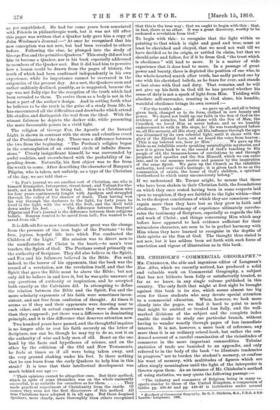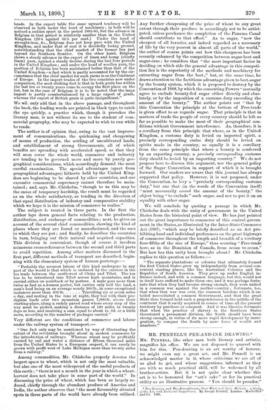MR. CHLSHOLAf'S " COMMERCIAL GEOGRAPHY."* Ma. CHIsHousf, the able and
ingenious editor of Longman's New Atlas, which we recently noticed, has produced a solid and valuable work on Commercial Geography, a subject that has not hitherto been fully or satisfactorily treated, so far as we know, in any single volume published in this country. The only fault that might at first sight be brought against this book is its size, which seems almost too big even for those students who may devote special attention to a commercial education. When, however, we look more closely into the pages, we find it hard to point to much that might be omitted or treated less fully, and the well- marked divisions of the subject and the complete index enable the reader to study one particular branch, without having to wander wearily through pages of less immediate interest. It is not, however, a mere book of reference, any more than it is an ordinary school-book, but rather the con- densed account of a careful examination of the vicissitudes of commerce in the more important commodities. Tabular statistics of trade are banished to an appendix, and only referred to in the body of the book " to illustrate tendencies in progress," not to burden the student's memory, or confuse his want of memory, with multitudes of figures which are often simply meaningless until the light of the interpreter is thrown upon them. As an instance of Mr. Chisholm's method of using statistics, we may quote the following passage :— " The industry and commerce of Belgium being in many re- spects similar to those of the United Kingdom, a comparison of tables pp. 438-40 and pp. 448-49 is instructive under several + Handbook of Commercial Geography. By G. G. Chisholm, F.R.G. it
London : Lonirmans. 1889.
heads. In the export table the same upward tendency will be observed in both under the head, of machinery ; in both will be noticed a sudden spurt -in the period 1881-85, but the advance in Belgium in that period is relatively smaller than in the United Kingdom (29.4 against 56-6 per cent.) Under the head of wrought-iron, &c., Belgium does not keep pace with the United Kingdom, and under that of coal it is decidedly losing ground, notwithstanding that the chief market of the former lies just beyond the Southern frontier. On the other hand, Belgium shows a steady advance in the export of linen and hemp (chiefly linen) yarn, against a steady decline during the last four periods in the United Kingdom ; and under the head of woollen yarn, the position of Belgium has been maintained better than that of the United Kingdom—a fact which is partly accounted for by the cir- cumstance that the chief market for such yarns is on the Continent of Europe. In the import trades of the two countries now under comparison, the most striking fact is that in both grain has within the last ten or twenty years come to occupy the first place on the list, but in the case of Belgium it is to be noted that the large import is partly counterbalanced by a large export of grain, whereas the export of British grain is quite insignificant."
We wil only add that in the above passage, and throughout the book, the leading words are printed in black type, to catch
the eye quickly, a practice which, though it provokes the literary man, is not without its use to the student of com- mercial geography, who may be expected to wish to run while he reads.
The author is of opinion that, owing to the vast improve- ment of communications, the quickening and cheapening of means of production, the settling of uncultivated lands, and establishment of strong Governments, all of which benefits are spreading with accelerated speed, so that they will soon cover the whole world, commerce and industry are tending to be governed more and more by purely geo- graphical considerations, which accordingly demand the most careful examination. The special advantages (apart from geographical advantages) hitherto held by the United King- dom are beginning to be shared by other countries, and our excessive commercial supremacy cannot therefore be main- tained ; and, says Mr. Chisholm, " though to us this may be the cause of temporary hardship, the result must be regarded as on the whole satisfactory, as tending in the direction of that equal distribution of industry and comparative stability which we hope it is the mission of commerce to realise."
The subject is treated in three parts. In the first the author lays down general facts relating to the production, distribution, and exchange of commodities ; next, he gives an account of the several chief commodities, showing the kind of places where they are found or manufactured, and the uses to which they are put ; and finally, he describes the countries in turn, bringing out their natural and acquired capacities. This division is convenient, though of course it involves numerous cross-references between the second and third parts to avoid repetition. Among other matters discussed in the first part, different methods of transport are described, begin- ning with the elementary system of human porterage
Probably the severest labour of this kind undergone in any part of the world is that which is endured by the carriers in the tea trade between the south-west of China and Tibet. The tea has to be introduced into Tibet across high mountains, and is carried either on muleback or by porters. A mule goes more than twice as fast as a. human porter, but carries only half the load, a man's load being on an average nearly 200lb., in some exceptional
instances more than 400 lb Travelling six or seven miles a day, and resting in the inns at night, they toil with their pro- digious loads over two mountain passes 7,000 ft. above their starting-place, along a rudely paved road where every step of the way must be picked, making a distance of 120 miles in twenty days or less, and receiving a sum equal to about ls. 6d. or a little more, according to the number of packages carried."
Very diffeient are the conditions of commerce and labour under the railway system of transport One fact only may be mentioned by way of illustrating the extent of the revolution brought about in modern commerce by the introduction of railways. Whereas wheat may be profitably carried by rail and water a distance of fifteen thousand miles from the United States to a European seaport, it can rarely be grown with profit west of Lake Michigan more than twenty miles from a railway."
Among commodities, Mr. Chisholm properly devotes the
largest space to wheat, which is not only the most valuable, but also one of the most widespread of the useful products of this earth ; " there is not a month in the year in which a wheat- harvest does not take place in some part of the world." In discussing the price of wheat, which has been so largely re- duced, chiefly through the abundant produce of America and India, the author observes that "the most favourably situated spots in these parts of the world have already been utilised. Any further cheapening of the price of wheat to any great extent through their produce is accordingly not to be antici- pated, unless perchance the completion of the Panama Canal should contribute to that effect." As to sugar, " now the cheapest of all luxuries, and indeed regarded as a necessary of life by the very poorest in almost all parts of the world," the author of course points out how this cheapness has been recently enhanced by the competition between sugar-beet and sugar-cane ; he considers that " the most important factor in deciding on which side the general advantage in this competi- tion lies is the superiority of the methods and machinery for extracting sugar from the beet ;" but, at the same time, he draws attention to the factitious advantage given to beet-sugar by the bounty system, which it is proposed to destroy by the Convention of 1888, by which the consenting Powers "mutually agree to exclude bounty-fed sugar either directly and abso- lutely, or by the imposition of a customs duty exceeding the amount of the bounty." The author points out " that by
this Convention the principle at the bottom of Free-trade is given effect to as regards sugar. That principle is that in
matters of trade the people of every country should be left so
far as possible to make the most of their geographical con- ditions without Government interference. As, therefore, it is, a corollary from this principle that where, as in the United
Kingdom, a customs duty is levied on imported spirit, a precisely corresponding excise duty should be levied on
spirits made in the country, so equally it is a corollary from the same principle that where a bounty is conferred , by an exporting country, a precisely corresponding customs
duty should be levied by an importing country." We do not propose here to discuss this argument, nor the general policy of the Sugar Convention in support of which it is brought forward. Our readers are aware that this journal has always supported that policy. However, it is not proposed, under the Convention, to levy a " precisely corresponding customs
duty," but one that (in the words of the Convention itself) "must necessarily exceed the amount of the bounty," the
object being "to exclude" such sugar, and not to put it on an equality with other sugar.
We will conclude by quoting a passage in which Mr. Chisholm deals with the unity of government in the United States from the historical point of view. He has just pointed out the great importance to commerce of this central govern- ment in the States, as illustrated by the Inter-State Commerce Act (1887), "which may be briefly described as an Act pro- hibiting local and individual preferences on the great highways of commerce throughout the length and breadth of a territory four-fifths of the size of Europe," thus securing " Free-trade here, as in the Dominion of Canada, from ocean to ocean." But how has this unity been brought about ? Mr. Chisholm replies to this question as follows
The separate plantations or colonies that ultimately formed the first United States grew up independently from several con- venient starting places, like the Australian Colonies and the Republics of South America. They grew up under English in- fluence indeed, and with a common language, but this would not in itself have sufficed to make them one, and it was perhaps fortu- nate that when they had become strong enough, they were united in a common war against the mother-country ; fortunate, too, that when that war was over, the common burdens which it en- tailed necessitated a common Government, and that the great State thus formed held such a preponderance in the middle of the continent that it easily acquired in course of time all the present territory by purchase or conquest. And it was likewise fortunate that when the practice of slavery in the Southern States threatened a permanent division, the North should have been strong enough, in virtue of its more rapid development by immi- gration, to conquer the South by mere force of wealth and numbers."







































 Previous page
Previous page